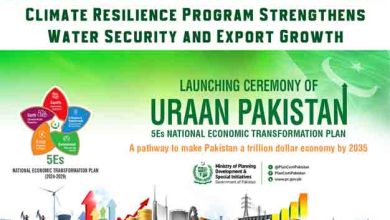Revolutionary CM Punjab Green Credit Programme Ignites Hope for Pakistan’s Climate Future
The CM Punjab Green Credit Programme is Pakistan’s first incentive-based environmental policy, rewarding citizens for eco-friendly actions. Discover how this visionary initiative is transforming climate engagement in Punjab.
The CM Punjab Green Credit Programme is making headlines as Pakistan’s first performance-based environmental rewards system, igniting hope across the country for a greener, citizen-driven climate movement. Launched by Punjab Chief Minister Maryam Nawaz Sharif, the initiative marks a transformative shift in how climate action is incentivized and implemented in the region.
In a time when global warming, deforestation, and pollution are escalating, this bold and visionary programme aligns local governance with international sustainability goals.
What is the CM Punjab Green Credit Programme?
The CM Punjab Green Credit Programme is a first-of-its-kind performance-based incentive system that rewards citizens for verified climate-positive actions. Designed to engage the public in climate resilience efforts, the programme promotes awareness, accountability, and financial motivation.
According to renowned environmentalist Dr. Mahmood Khalid Qamar, the initiative identifies 32 specific climate-positive actions spread across critical environmental sectors:
- Air quality
- Water conservation
- Land restoration
- Solid waste management
- Biodiversity & ecology
- Public awareness and education
For every verified action, participants receive a Green Credit worth Rs 10,000, along with opportunities for public recognition and access to further environmental rewards.
Incentives and Impact: How Citizens Earn Green Credits
Each climate-friendly action under the CM Punjab Green Credit Programme earns participants tangible and moral incentives:
- Cash reward of Rs 10,000 per verified action
- Certificates of recognition.
- Possible inclusion in government eco-projects
- Priority in future sustainability grants
These rewards aim to transform everyday citizens into climate warriors, pushing for behavior change and practical impact through monetary and symbolic appreciation.
Pilot Phase in Lahore: A Testing Ground for Climate Action
As of June 2025, the programme is limited to Lahore as part of its pilot rollout. Verified actions must occur within Lahore’s city limits to qualify for the rewards. However, the success of this phase could pave the way for expansion into other districts across Punjab and eventually, nationwide.
In conjunction with this initiative, the Punjab government has allocated Rs 3 billion for the region’s first Climate Observatory in Lahore in FY 2025–26. This high-tech monitoring facility will track:
- Urban temperature trends
- Carbon emissions
- Tree cover loss
- Air quality indexes
This integration of data-driven insights and public participation sets a new standard for climate governance in Pakistan.
Massive Investments in Green Infrastructure
Alongside the CM Punjab Green Credit Programme, the provincial government has launched a series of green development initiatives, including:
- Development of over 200 green areas across Lahore
- Special focus on 65+ traffic choke points to reduce vehicular emissions
- Investment of $22 million in eco-urban development (90% international funding, 10% provincial support)
- Priority planting of native tree species for long-term environmental stability
These actions demonstrate the Punjab government’s commitment to reducing urban heat, improving biodiversity, and promoting nature-based solutions.
The Climate Budget Tagging Framework: A Historic Allocation
One of the most powerful structural reforms introduced is the Climate Budget Tagging Framework, which earmarks Rs 795 billion — around 64% of the Annual Development Programme — for climate-related spending:
| Category | Allocation (Rs) |
|---|---|
| Climate Adaptation | 277.4 Billion |
| Climate Mitigation | 371.7 Billion |
| Institutional Support & Awareness | 146 Billion |
This framework ensures that climate considerations are embedded into core development strategies, from infrastructure to social protection.
Public Praise and Support from Conservation Experts
Naeem Bajwa, President of the Lahore Conservation Society, praised the initiative, calling it a landmark step toward green transformation.
He emphasized the combined impact of this programme and the Free Solar Panel Scheme, saying:
“These projects empower citizens to take responsibility, promoting energy independence and environmental stewardship.”
Environmental groups, academic circles, and civil society organizations have also expressed enthusiastic support for this model, urging for its replication in other provinces.
The Way Forward: A Replicable Climate Solution
If scaled up successfully, the CM Punjab Green Credit Programme could become a national model for environmental engagement. Its framework aligns with:
- UN Sustainable Development Goals (SDGs)
- Paris Climate Agreement targets
- Regional climate cooperation agendas (e.g., SAARC, SCO)
This program shows that incentive-based climate action can bridge the gap between policy and public participation — a major barrier in most developing countries.
Conclusion: Empowering Citizens for a Sustainable Pakistan
The CM Punjab Green Credit Programme stands as a groundbreaking effort to redefine climate action in Pakistan. By monetizing sustainability and rewarding responsibility, this initiative has the potential to inspire millions to become agents of change.
As climate risks grow more severe, such positive, proactive, and inclusive programmes are vital for shaping a resilient, green, and sustainable future for Punjab and beyond.
With citizen involvement, transparent rewards, and visionary leadership, Pakistan is taking a confident step towards environmental transformation.
External Links :
- Punjab Environment Department
- UN Sustainable Development Goals
- Climate Budget Tagging Framework Overview







